新概念第二册第25课
- 格式:ppt
- 大小:2.93 MB
- 文档页数:29
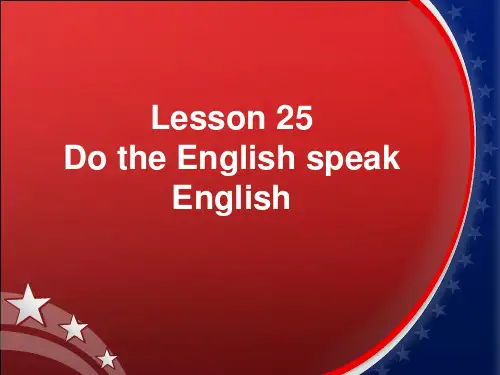
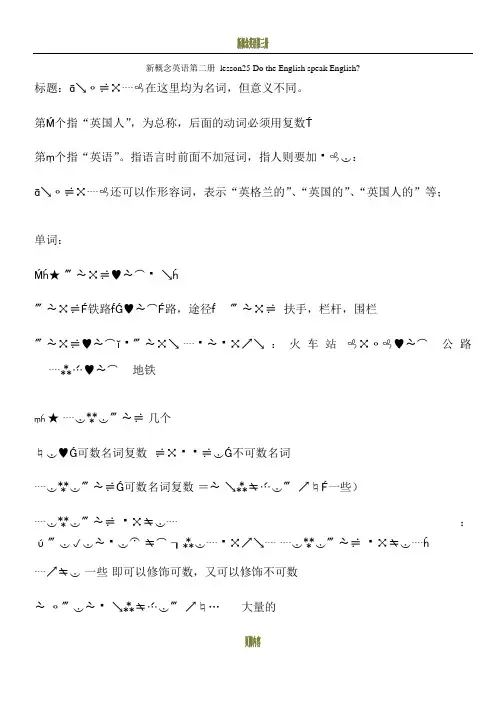
新概念英语第二册lesson25 Do the English speak English?标题: 在这里均为名词,但意义不同。
第 个指“英国人”,为总称,后面的动词必须用复数第 个指“英语”。
指语言时前面不加冠词,指人则要加 :还可以作形容词,表示“英格兰的”、“英国的”、“英国人的”等;单词:★铁路 路,途径 扶手,栏杆,围栏:火车站 公路 地铁★ 几个可数名词复数 不可数名词可数名词复数 = 一些):一些 即可以修饰可数,又可以修饰不可数… 大量的一段时间 一段时间以前某时 有时 偶尔★ 外国人 蓝眼睛外国人①外国的,海外的外国留学生: 洋货: 外交事务:②陌生的★ 感到奇怪① 对 事情感奇怪② 想要知道③ 对什么感到怀疑你对什么感到疑惑呀?④ … 难怪…奇观世界古代七大奇观极好的练习: 我想知道她什么时候能来。
不知道为什么仓库今天关门了。
我在想你会不会帮我。
’这是个巨大的奇迹。
’课文:大地方 小地方表示到达:强调努力的结果表示一种结局次序上的最后黑暗的( )深的( )忧郁的( )…… … ………… 不仅…而且…他不仅自编剧本,还饰演其中的角色。
这个年轻人不仅聪明,而且很勤奋。
练习: 他不但很聪明,而且很勤奋( )。
他不但吸烟,而且喝酒。
她不但会说 英语,而且会说德语。
这个短语本身的含义是“也”、“又”、“还”:玛丽不仅找到了她姑妈,而且还在她那里住了两星期。
连接整个谓语如果你明天回家,我也回。
他把钢笔借给了我,还有字典。
既不 也不 两者都不(用 … …连接并列主语时,谓语则随最后一个主语的人称和数而变 就近原则)若将 句型变为肯定句,只需把 改为 即可,同时谓语动词必须用复数形式。
练习: 她既不胖也不瘦。
我既没有给他打电话,也没有给他写信。
我既没有钱也没有时间去旅游。
更强调个人或个别, 更强调全体或全部语法:并列句 把两个或几个简单句用并列连词连接起来,则成为一个并列句。
’’’’表示并列关系的并列连词,这类连词主要有 …… … … 等。
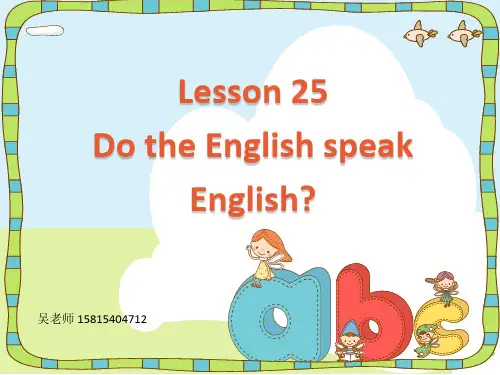

《新概念》英语二册第25课课文赏析李正宏Lesson25 Do the English speak English?I arrived in London at last. The railway station was big, black and dark. I did not know the way to my hotel, so I asked a porter. I not only spoke English very carefully, but very clearly as well. The porter, however, could not understand me. I repeated my question several times and at last he understood. He answered me, but he spoke neither slow ly nor clearly. ‘I am a foreigner,’ I said. Then he spoke slowly, but I could not understand him. My teacher never spoke English like that! The porter and I looked at each other and smiled. Then he said something and I understood it.‘You’ll soon learn English!’ he said. I wonder. In England, each man speaks a different language. The English understand each other, but I don’t understand them ! Do they speak English ?《新概念》英语二册第25课标题是 Do English speak English? 讲述一个外国人第一次坐火车去伦敦的感受和经历。
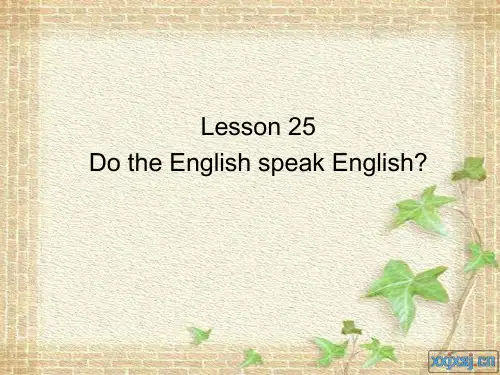
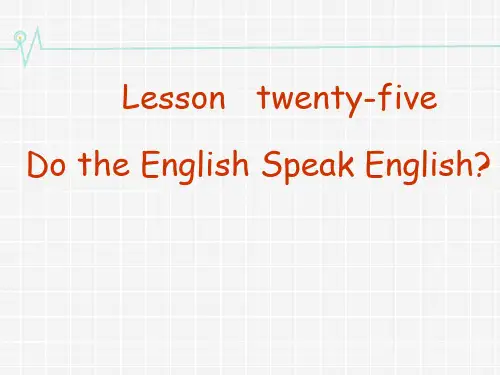
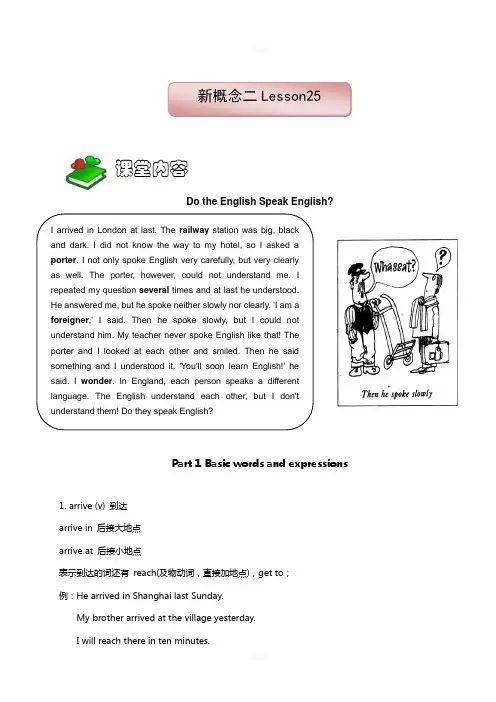
新概念二Lesson25课堂内容Do the English Speak English?I arrived in London at last. The railway station was big, blackand dark. I did not know the way to my hotel, so I asked aporter. I not only spoke English very carefully, but very clearlyas well. The porter, however, could not understand me. Irepeated my question several times and at last he understood.He answered me, but he spoke neither slowly nor clearly. 'I am a foreigner,' I said. Then he spoke slowly, but I could not understand him. My teacher never spoke English like that! Theporter and I looked at each other and smiled. Then he said something and I understood it. 'You'll soon learn English!' hesaid. I wonder. In England, each person speaks a different language. The English understand each other, but I don't understand them! Do they speak English?Part 1 Basic words and expressions1. arrive (v) 到达arrive in 后接大地点arrive at 后接小地点表示到达的词还有reach(及物动词,直接加地点),get to;例:He arrived in Shanghai last Sunday.My brother arrived at the village yesterday.I will reach there in ten minutes.When will you get to school?2. at last 最终;最后相当于finallyAfter some hard work, he passed the exam at last.3. railway n.铁路【词义相关】railroad 铁路(美)railway/railroad station 火车站The railway station was big, black and dark.A new railway is being built.4. the way to…去某地的路I don’t know the way to the nearest station.5. porter n.搬运工Did you remember to tip the porter? 你记得给搬运工小费了吗?6. not on ly…but also…的用法用于连接两个表示并列关系的成分,着重强调后者,其意为“不仅……而且……”;其中的also有时可以省略。

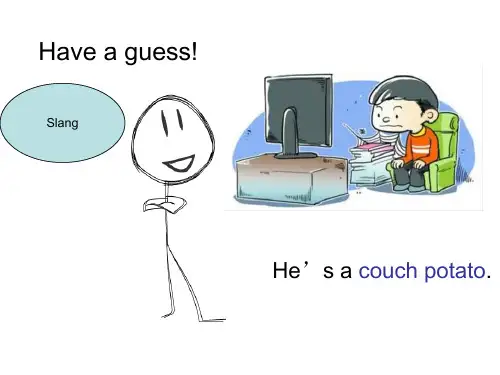
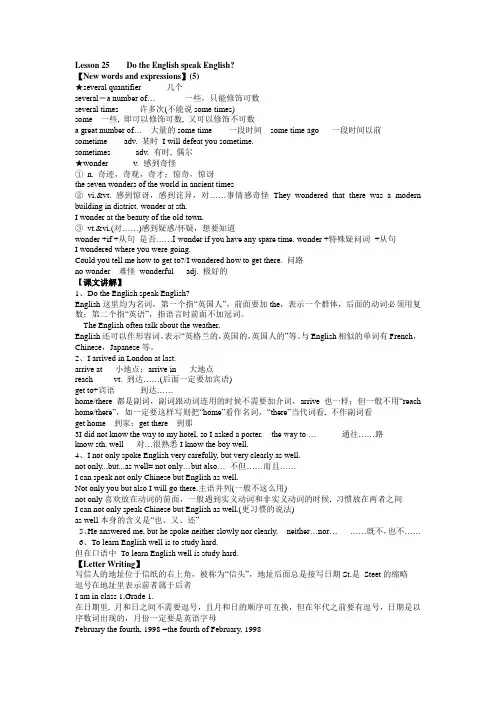
Lesson 25 Do the English speak English?【New words and expressions】(5)★several quantifier 几个several=a number of… 一些,只能修饰可数several times 许多次(不能说some times)some 一些, 即可以修饰可数, 又可以修饰不可数a great number of… 大量的some time 一段时间some time ago 一段时间以前sometime adv. 某时I will defeat you sometime.sometimes adv. 有时, 偶尔★wonder v. 感到奇怪①n. 奇迹,奇观,奇才;惊奇,惊讶the seven wonders of the world in ancient times②vi.&vt. 感到惊讶,感到诧异,对……事情感奇怪They wondered that there was a modern building in district. wonder at sth.I wonder at the beauty of the old town.③vt.&vi.(对……)感到疑惑/怀疑,想要知道wonder +if +从句是否……I wonder if you have any spare time. wonder +特殊疑问词+从句I wondered where you were going.Could you tell me how to get to?/I wondered how to get there. 问路no wonder 难怪wonderful adj. 极好的【课文讲解】1、Do the English speak English?English这里均为名词,第一个指“英国人”,前面要加the,表示一个群体,后面的动词必须用复数;第二个指“英语”,指语言时前面不加冠词。
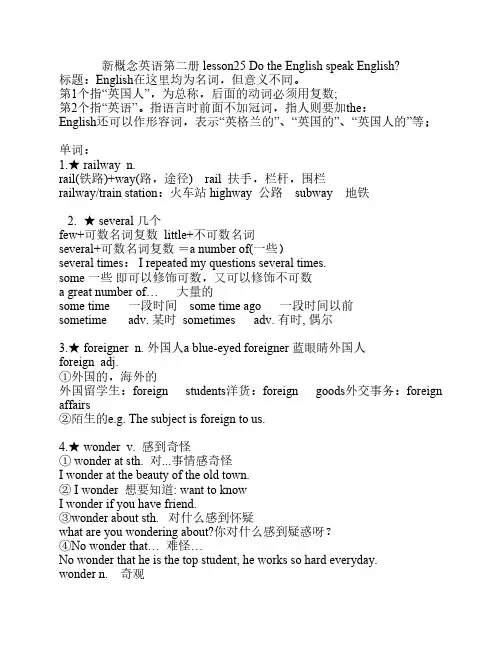
新概念英语第二册 lesson25 Do the English speak English?标题:English在这里均为名词,但意义不同。
第1个指“英国人”,为总称,后面的动词必须用复数;第2个指“英语”。
指语言时前面不加冠词,指人则要加the:English还可以作形容词,表示“英格兰的”、“英国的”、“英国人的”等;单词:1.★ railway n.rail(铁路)+way(路,途径) rail 扶手,栏杆,围栏railway/train station:火车站 highway 公路 subway 地铁2. ★ several 几个few+可数名词复数 little+不可数名词several+可数名词复数=a number of(一些)several times: I repeated my questions several times.some 一些即可以修饰可数,又可以修饰不可数a great number of… 大量的some time 一段时间 some time ago 一段时间以前sometime adv. 某时 sometimes adv. 有时, 偶尔3.★ foreigner n. 外国人a blue-eyed foreigner 蓝眼睛外国人foreign adj.①外国的,海外的外国留学生:foreign students洋货:foreign goods外交事务:foreign affairs②陌生的e.g. The subject is foreign to us.4.★ wonder v. 感到奇怪① wonder at sth. 对...事情感奇怪I wonder at the beauty of the old town.② I wonder 想要知道: want to knowI wonder if you have friend.③wonder about sth. 对什么感到怀疑what are you wondering about?你对什么感到疑惑呀?④No wonder that… 难怪…No wonder that he is the top student, he works so hard everyday.wonder n. 奇观Jane is a wonder. She never fails in her examinations.the seven wonders of the world in ancient times 世界古代七大奇观wonderful adj. 极好的e.g.I would be a wonderful wife.练习:1. 我想知道她什么时候能来。